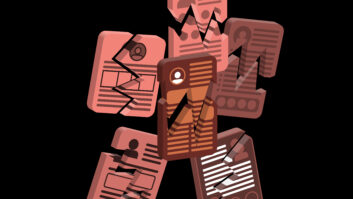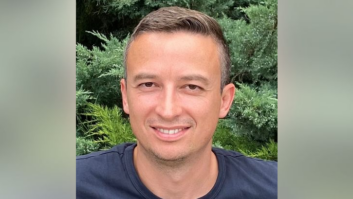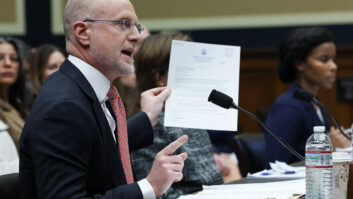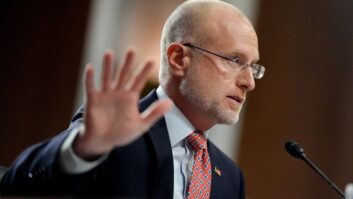Radio stations that play music over the air pay annual fees to three performance rights organizations: ASCAP, BMI and SESAC. Anyone who wishes to stream music from a website can purchase a digital license from these same agencies.

The logo for Milberg’s pending podcast plays up the oldies theme.
But what if one wishes to create a podcast that contains music, and make that podcast downloadable from iTunes and other distribution sites? To whom does one send the check, and for what amount?
Uncovering this information was not straightforward, as I discovered when I attempted to assist my friend David Milberg, a veteran broadcast executive and air personality who wanted to get an oldies podcast up and running by early 2016.
Milberg is a lawyer and a broadcast law professor; he wanted to keep his podcast legal in all respects and pay any appropriate fees.
I started my research by contacting Kevin M. Goldberg, a member at Fletcher, Heald & Hildreth PLC.
NOT A SIMPLE QUESTION
“Podcasts are pretty complex,” he said. “First, there is a difference between a downloadable podcast and a non-downloadable podcast. The former is likely to be more difficult because it involves mechanical reproduction. There is a compulsory rate for the reproduction of the musical work, but the use of the sound recording is going to have to be negotiated. A non-downloadable podcast might work more efficiently if you stay within certain rules regarding archived programming. That would allow it to be considered non-interactive streaming, allowed under the Sound Exchange licenses. But to qualify as an archived program, it must be at least five hours long and even then can only stay on the website for two weeks.”
I asked Goldberg about the future of licensing music for podcasts.
“It appears that the problem is not easily answered, but the likelihood of getting to a result that would make much practical sense seems limited,” he said.
Very well! I then contacted BMI and was put in contact with Molly Thompson, a digital licensing specialist based in Nashville, Tenn. She told me about BMI’s digital license.
“The license will cover all usage of BMI music, whether in a podcast, audio-only stream, videos, etc. The license provides blanket coverage for your URL,” she told me.
Unfortunately the type of podcast I was referring to would be available not via a single URL, but on iTunes and other similar sites. So it was still legally murky.
ASCAP’s representative told me that licensing is available for streaming audio, but for podcasts I would have to contact the individual publishers for each song I wished to play, and work out permission and a licensing fee with all of them. That hardly seemed practical.
The folks at SESAC, the third PRO, did not answer several emails.

Melodie A. VirtueTHE RIGHT TO REPRODUCE
One would think that licensing music within a downloadable podcast would be a simple matter of going to a website, grabbing a form and sending it in with a check. But the process is more like entering labyrinth of tunnels, none of which leads anywhere.
Melodie Virtue is an expert in broadcast law at Garvey Schubert Barer, and she agreed that there is no workable solution at this time.
“For the right to reproduce the sound recording, a podcaster needs to secure a master use license directly from the record company,” Virtue said. “The record label can charge what it wants and is not required to grant a master use license. Direct licensing is required to use any music in a downloadable podcast, unless the musical work [composition] and sound recording [recorded performance] are in the public domain or made available through a creative commons type of license, or the person using the music owns all of the copyrights in it.”
David Oxenford of the firm Wilkinson Barker Knauer, LLP, was asked in an interview by radio pundit Mark Ramsey why record companies don’t all get together and come up with a way to allow podcasters to include music legally.
“I think it’s inertia,” Oxenford said in the interview, available at markramseymedia.com. “We’re talking about little bits of revenue, and as we all know, in the Internet world little bits of revenue add up eventually to big revenue. But to take the initiative to get the rights to make these songs available in an easy way and set the pricing schedules and to make songs available to podcast or for other on-demand uses, it’s not a simple process. It involves negotiations with the artists and the composers, so I think the record companies simply haven’t gotten around to it.”

David MilbergSTUCK IN THE GRAY, FOR NOW
So where do these legal opinions leave my friend David Milberg as he attempts to produce an oldies podcast?
“It is rather simple and relatively inexpensive to obtain the necessary blanket licenses to cover all aspects of streaming,” said Milberg. “But the same is not true for music podcasting. While there are some licensors of ‘pod-safe’ music, the material tends not to be the ‘hits’ or ‘oldies’ that are owned by major record companies. It also is unclear if licenses for podcast music sold by the PROs are actually necessary since there is some question as to whether podcasts are ‘public performances,’ which is what these performing rights organizations license.”
Given this conundrum for podcasters, how does Milberg think is it possible that one can go to iTunes and find dozens of downloadable shows that contain popular music?
“I do not know in all instances, but my opinion is that it could be a combination of ignorance and/or indifference to applicable copyright laws combined with a lack of concerted compliance enforcement by copyright owners,” he said.
Milberg, in his on-air persona Radio Dave, was a frequent guest on “The Bill Moller Show” heard over WGN(AM), Chicago. On these shows, Milberg talked about the oldies, but only a small portion of each song was heard.
Here are some helpful sources for prospective podcasters:
www.ascap.com
www.bmi.com
https://secure.harryfox.com/public/Licensing-GeneralFAQ.jsp#119
http://socialnetworking.lovetoknow.com/Difference_Between_Podcasting_and_Streaming
www.soundexchange.com
“We only played 20 or 30-second ‘snippets’ in order to avoid ASCAP, BMI and SESAC fees that would have applied if the songs had been played all the way through,” said Milberg. “The station subsequently posted these shows online as podcasts. I assume the theory behind all of this was that these excerpts from the songs fell into the ‘fair use’ defense exception to applicable copyright laws.”
So when Milberg’s oldies podcast, “Rare & Scratchy Rock ’n Roll,” pops up next year on various sites for downloading, that is the form it will take. Due to the vagaries of copyright law, it’ll be “parts of the hits, all the time!”
Ken Deutsch was a disc jockey and program director in the days when things were “groovy” and people said “far out” with no irony.







